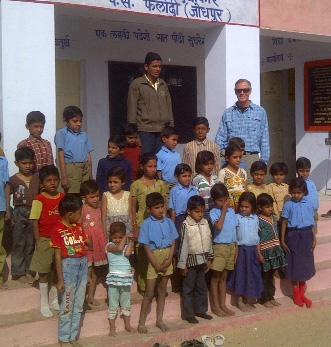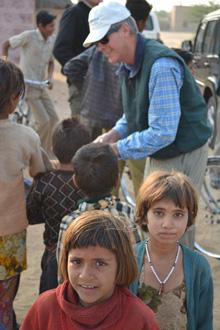Elstrott honored with dedication of elementary school in India
John Elstrott’s name has been synonymous with entrepreneurship education at the Freeman School for more than 25 years. Now, thanks to a California-based company, Elstrott’s name is synonymous with education in rural India as well.

In December, Traditional Medicinals honored Elstrott with the dedication of the Dr. John B. Elstrott Elementary School in Dayakaur, Rajasthan, India. The school, located approximately 120 miles from Jodhpur in the Thar Desert, is one of three built in India by the company, a maker of herbal medicinal teas and dietary supplements. Elstrott has been a board member and partner in the company for more than 30 years.
As part of its Revive! Project, Traditional Medicinals is investing $1 million in six Rajasthan farming villages critical to the company’s herbal supply chain. The project includes training for villagers in a variety of areas, including agricultural and conservation best practices, community organization and leadership, and, for women in the villages, health, hygiene and empowerment. In exchange for the investments in their communities, parents agree to send their children, including girls, to school.
“Education is the key to a better life for the people and their children, particularly for the women in these tribes,” says Elstrott, professor of practice and executive director of the Levy-Rosenblum Institute for Entrepreneurship, who traveled to India for the dedication ceremony. “I could see in a very substantive way how these schools are changing the culture of the villages, empowering the next generation and making stronger, more prosperous communities.”

Elstrott is a longtime champion of the business philosophy known as conscious capitalism, which emphasizes the importance for organizations to consider the interests of all stakeholders as well as the environment. Throughout his long association with Traditional Medicinals, Elstrott has worked closely with company co-founder and Chairman Drake Sadler, a fellow conscious capitalist, to incorporate those principles into the company’s activities.
“For us, it’s obviously a win-win strategy,” says Elstrott. “If we strengthen these communities and strengthen their ties to us, they produce a better quality herb for us and they’re a more dependable source because there’s always going to be another generation of farmers. It’s very important to our long-term growth and profitability for all our stakeholders that we reinvest in all the communities of farmers and gatherers around the world where these herbs come from.”
Interested in advancing your education and/or career? Learn more about Freeman’s wide range of graduate and undergraduate programs. Find the right program for you.
Other Related Articles
- Deseret News: Californians are asking, is it time to raise taxes on the rich?
- Harvard Business Review: Why AI Boosts Creativity for Some Employees but Not Others
- Forbes: How To Talk Politics With Family Over The Holiday
- AI-powered fund takes top prize in Aaron Selber Jr. Hedge Fund Course
- De Franco appointed Keehn Berry Chair of Banking and Finance
- The Wall Street Journal: For Trump, the Warner Megadeal Talks Are All About CNN
- Research Notes: Matthew Higgins
- NBC News: Elon Musk has left the White House, but he hasn't left politics behind on X
